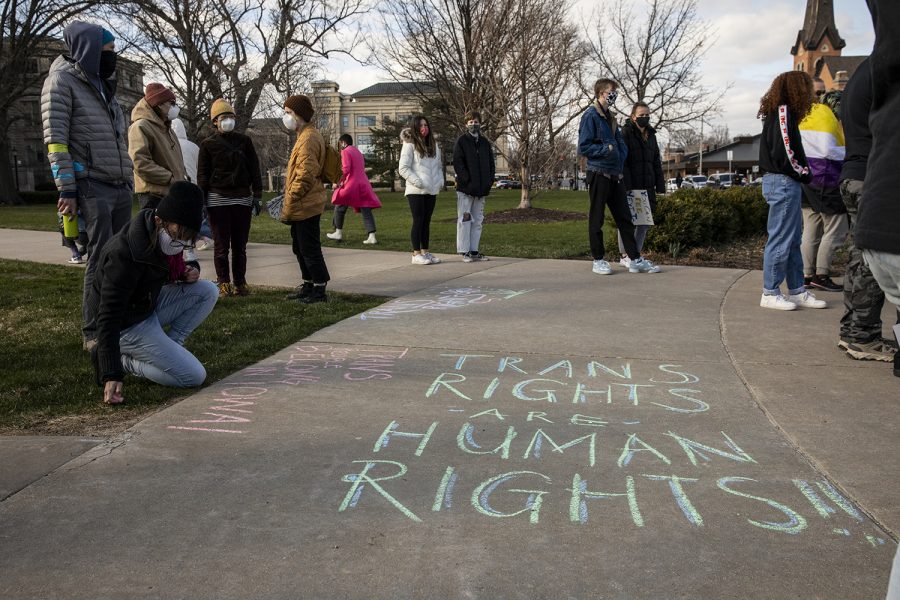Iowa City, Johnson County pass proclamations supporting transgender rights on Transgender Day of Visibility
The proclamations come after recent bills passed by the Iowa legislature restricting things such as transgender healthcare in the state.
Participants chalk the sidewalk during the Trans Day of Visibility rally at the Pentacrest on Wednesday, March 31, 2021. The event was put on by the LGBTQ Iowa Archives and Library, and featured chalking and speeches by members of the community.
March 30, 2023
The Iowa City City Council and the Johnson County Board of Supervisors proclaimed their support for Transgender Day of Visibility amid the passage of several anti-transgender legislation in the state.
The city council and the board of supervisors unanimously passed their proclamations recognizing the holiday at their meetings on March 21 and March 30, respectively.
The city council’s proclamation recognized the contributions of Iowa City’s transgender community, expressed contempt for recent anti-transgender legislation across the nation and in Iowa, and called for the uplifting and support of transgender people everywhere.
As previously reported by The Daily Iowan, over 30 states passed 130 anti-transgender legislation in the 2022 legislative session. Iowa has also passed several anti-transgender bills, with the most recent proposed bill prohibiting the use of pronouns or a name that does not match a student’s birth certificate.
RELATED: Iowa City students hold demonstration for trans rights
Iowa City Mayor Bruce Teague voiced his support for the proclamation and all transgender, gender nonconforming, and nonbinary people at the March 21 meeting. In 2020, Teague became the city’s first openly gay, Black mayor.
“This proclamation meant a lot for this council to be able to present in this community at such a time as this,” Teague said. “You are loved, and you are seen, and we’ll continue to be a beacon voice in unity with you all.”
In an interview with the DI, Iowa City City Councilor Laura Bergus said she hopes the proclamation shows the that city stands Iowa City with the transgender community and recognizes how difficult this legislative session has been.
“I hope that the city standing up and saying what we believe as leaders can show that what is happening at the state level is wrong and immoral,” Bergus said. “We will not stand by and silently be complicit in that.”
The Johnson County Board of Supervisors unanimously passed its own proclamation during its formal meeting on March 30. The supervisors highlighted the struggles LGBTQ+ individuals face in areas like health care but also celebrated the work being done by local organizations and the community to support transgender individuals.
Although normally done by the chair, Supervisor V Fixmer-Oraiz read the county’s proclamation on behalf of the board to a packed board room full of transgender people and supporters. Fixmer-Oraiz, elected in the November 2022 election, became the first transgender person elected to a county position in Iowa.
At the formal meeting on March 23, Fixmer-Oraiz briefly commented on the recently-passed anti-transgender legislation.
“I guess we knew that it was coming, and it was just a very sad day. And also that restrooms are sex assigned to people’s birth. I don’t know how you police that, but I can assure you that there’s going to be a lot more bullying,” Fixmer-Oraiz said. “I think these bills are really targeted to some of our most vulnerable people.”
United Action For Youth Executive Director Talia Meidlinger thanked the supervisors for their support at a time when transgender youth were being attacked.
Some parents of transgender youth also spoke and thanked the board.
Fixmer-Oraiz emphasized the courage and strength of the people in attendance.
“It takes a lot more courage to be who you are than it does for legislators in Des Moines to write hateful bills. It takes mountains more courage,” they said. “There’s nothing wrong with you…you are the future that we need.”
Isabelle Foland, Sydney Libert, and Alejandro Rojas contributed to this report.



